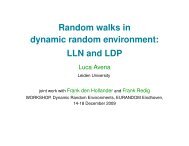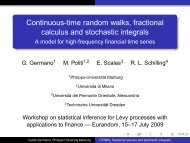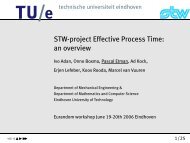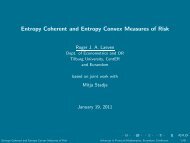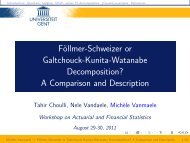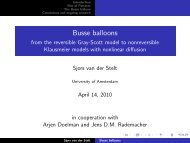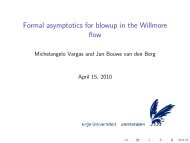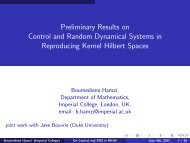EURANDOM
EURANDOM
EURANDOM
Create successful ePaper yourself
Turn your PDF publications into a flip-book with our unique Google optimized e-Paper software.
The workshop topic: Both Carnegie Mellon University (CMU) and Eindhoven University of Technology<br />
(TU/e), conduct research in the area of quantitative models for production/inventory and communication<br />
systems. There is significant overlap in the type of the problems that are studied, as well as in the<br />
style of the research performed. The objective of this workshop was to discuss future research directions<br />
and to investigate the possibilities for joint research projects and exchange of PhD students. The<br />
workshop consisted of many presentations of participants from CMU and TU/e. The CMU speakers<br />
were: Willem-Jan van Hoeve, Bahar Biller, Mustafa Akan, Nicola Secomandi, Robert Hampshire, Gabriela<br />
Muratore, Erkut Sonmez, Ana Busic, Marha Shunko, Anshul Gandhi and Paul Enders. The speakers<br />
from TU/e were: Jacques Resing, Marco Slikker, Ton de Kok, Gerhard Woeginger, Jan van der Wal, Maria<br />
Vlasiou, Sandra van Wijk, Matthias Mnich, Josine Bruin and Kurtulus Öner. Apart from talks, there<br />
was also a company visit to ASML, including a factory tour and presentations of new challenges at<br />
ASML with respect to the supply chain for new machines. During the 3-day workshop these ASML reallife<br />
problems were discussed in groups, the outcomes of which were presented in a feedback session to<br />
ASML. In addition, there was also plenty of time for group discussions on possible joint research<br />
projects. The meeting was very successful, especially the involvement of ASML and the group discussions<br />
on possible joint research projects. It has led to a further strengthening of the ties between CMU<br />
and TU/e, and initiated new collaborations and exchanges.<br />
Sponsors:<br />
TU/e research cluster Logistics, Operations, and their Information Systems (LOIS)<br />
March 23-27, 2009 (RSS)<br />
YEP VI (Young European Probabilists) - Fragmentation, coalescence and probabilistic genetics<br />
Organizers:<br />
Peter Moerters, University of Bath<br />
Julien Berestycki, Université Pierre et Marie Curie<br />
Participants: 45<br />
This workshop was the sixth in a successful series of YEP meetings at <strong>EURANDOM</strong> in the years 2004-<br />
2009. This year, the main focus of the workshop was on "Fragmentation, coalescence and probabilistic<br />
genetics". Fragmentation processes model situations in which an object falls apart with time (e.g.<br />
through splitting, erosion or break-ups) while coalescence processes describe systems where clusters<br />
aggregate to form larger structures (e.g. through coagulation, gelation or aggregation). These<br />
processes have been the focus of a lot of attention in recent years, partly because of the wide variety<br />
of contexts in which they appear (for example in population genetics and evolutionary biology, physical<br />
chemistry or astrophysics) and partly because of the rich relations to other important areas of probability<br />
research, such as branching processes, random trees or random self-similar structures. The main<br />
focus of the workshop was on new mathematical developments and applications to populations genetics.<br />
The workshop was organized around two mini-courses. Nathanaël Berestycki (University of Cambridge)<br />
gave a course about coalescent processes and population genetics while Bénédicte Haas (Université<br />
Paris Dauphine) focused on Self-similar fragmentations and random real trees. The speakers, which are<br />
top experts in their fields, were very mindful of their audience and managed to present some of the<br />
most advanced and recent developments in this field with exceptional clarity and interest. Both minicourses<br />
were of exceptional quality and interest.<br />
Matthias Birkner and Alexander Gnedin contributed to the success of this edition of YEP by giving two<br />
excellent lectures: Matthias Birkner's topic was Lambda coalescents and population genetic inference<br />
while Alexander Gnedin had a two-parts programme Regenerative partitions and A coupling method<br />
for exchangeable coalescents.<br />
This workshop gathered 45 registered participants, most of them at an early stage of their career, typically<br />
in the final phase of their PhD or PD, coming from several European countries. The two-fold goal<br />
of YEP - exposing young reasearchers to new and exciting directions in Probability on the one hand<br />
and fostering interactions and colaborations between them - was successfully achieved. Sixteen participants<br />
were asked to give a talk, and the quality and variety of their presentations contributed greatly<br />
to the success of this workshop. Finally the friendly and informal atmosphere in which the week was<br />
spent encouraged the intense scientific curiosity of the participants, encouraged exchanges and scientific<br />
bonds and made this event a very enjoyable experience.<br />
<strong>EURANDOM</strong> Annual Report 2009 25



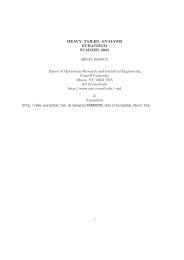
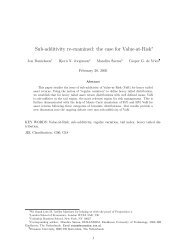
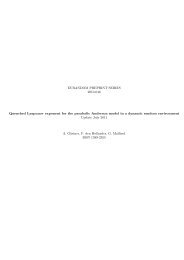
![The Contraction Method on C([0,1]) and Donsker's ... - Eurandom](https://img.yumpu.com/19554492/1/190x143/the-contraction-method-on-c01-and-donskers-eurandom.jpg?quality=85)
